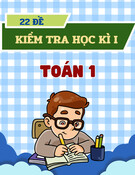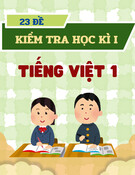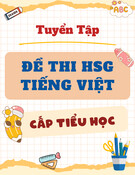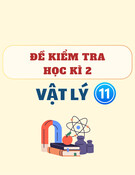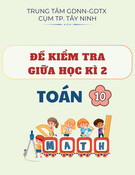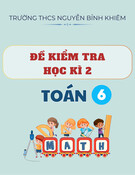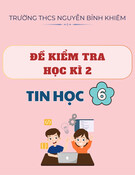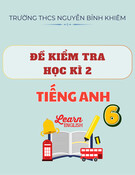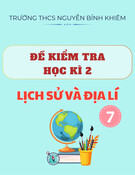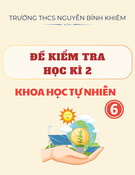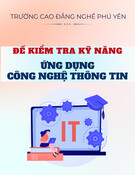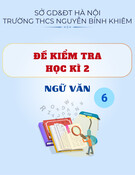
Mã đề 101 Page 1/4
TRƯỜNG THPT NGÔ GIA TỰ
TỔ: TIẾNG ANH
ĐỀ KIỂM TRA CUỐI KÌ II - NĂM HỌC 2024-2025
Môn: TIẾNG ANH - Lớp 10
Thời gian làm bài: 50 phút (không tính thời gian phát đề)
(Đề có 03 trang) Mã đề 101
Họ và tên: ................................................................. Số báo danh: .......................
LISTENING:
Part 1: Listen to the audio carefully and decide whether the following statements are True (T) or False
(F). You will listen TWICE. (1 point)
Question 1: Ecotourism always has a positive impact on nature.
A. True B. False
Question 2: Tourists disturbed sea turtles in Costa Rica while they were trying to lay eggs.
A. True B. False
Question 3: The report suggests that animals may become bolder and more vulnerable because of frequent
human interaction.
A. True B. False
Question 4: Animals become more cautious around predators when they are used to human presence.
A. True B. False
Part 2: Listen to the conversation between Andy and Leah. Circle the best answer A, B, C or D. You will
listen TWICE. (1 point)
Question 5: Leah’s aunt is leading a team of scientists studying wildlife in which location?
A. The Arctic B. Antarctica C. Africa D. The Amazon rainforest
Question 6: What animal does Leah’s aunt’s team mainly monitor?
A. Polar bears B. Seals C. King Penguins D. Whales
Question 7: According to Leah, what is NOT a reason causing animals to become endangered?
A. Illegal trading B. Deforestation C. Climate change D. Overpopulation of animals
Question 8: What suggestion do Leah and Andy come up with to help raise awareness?
A. Create a documentary B. Promote Leah’s aunt’s online classes
C. Start a fundraising event D. Travel to Antarctica themselves
Read the passage and choose the correct answer that best fits each of the numbered blanks (1.5 points)
Distance learning, also known as online education, has revolutionized the way we acquire knowledge. It allows
students from anywhere in the world to access quality (9) ______ with just an internet connection. This method
of learning is particularly beneficial for those (10) ______ cannot attend traditional schools due to
geographical, financial, or personal constraints. Distance learning offers a wide array of courses, ranging from
academic subjects to professional skills, (11) ______ to diverse interests and career goals.
One of the key advantages of distance learning is its flexibility. Students can study at their own pace, fitting
their education around (12)_________commitments like work or family. This self-paced approach helps
learners manage their time effectively and reduces stress. (13)________, distance learning also requires a high
degree of self-discipline and motivation, as the responsibility for keeping up with coursework lies primarily
with the student.
Despite the (14)_________, distance learning has opened up new possibilities for lifelong learning. It supports
the idea that education is not confined to a classroom or a specific phase in life but is an ongoing journey
accessible to all.
Question 9: A. educationally B. education C. educator D. educational
Question 10: A. what B. which C. who D. whom
Question 11: A. providing B. supplying C. equipping D. catering
Question 12: A. another B. others C. the others D. other
Question 13: A. However B. Then C. Though D. Moreover
Question 14: A. discussions B. advantages C. practices D. challenges
Read the following passage and mark the letter A, B, C, or D on your answer sheet to indicate the best
answer to each of the following questions. (2.5 points)
Packing school lunches is a daily task for many parents, but it also has a significant impact on the environment.
The typical lunchbox often contains plastic wrap, disposable juice boxes, snack bags, and individually
wrapped items. These materials are detrimental to the environment, as they take hundreds of years to break





